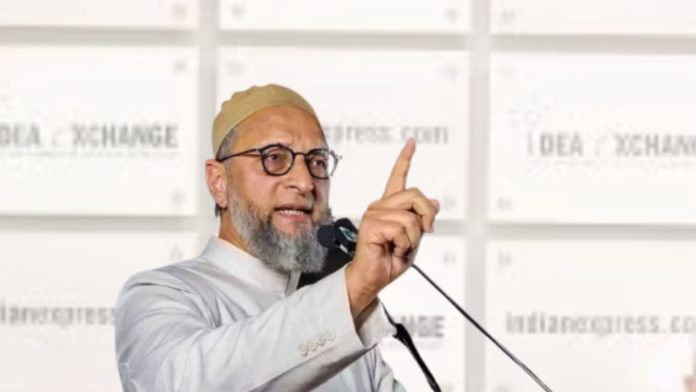(New Delhi): All India Majlis-e-Ittehadul Muslimeen (AIMIM) president Asaduddin Owaisi has warned that Parliament is being undermined by the government’s aggressive push of legislation without debate, calling the recent bills a direct threat to the Constitution’s separation of powers. Speaking in a wide-ranging interaction, at the IDEA Exchange Program organized by the Indian Express, Owaisi said the current BJP-led government remains focused on advancing its Hindutva agenda and consolidating power.
He criticized the passage of three key bills, including the Constitution (130th Amendment) Bill and the Jammu and Kashmir Reorganization (Amendment) Bill, which he said dangerously empower the Executive. According to him, these changes allow unelected bureaucrats to overrule elected governments and erode accountability. Owaisi described this as a “1933 Gestapo moment in Indian political history.”
Owaisi also hit out at the functioning of Parliament, where he said the Opposition is denied its constitutional role of questioning the government. “If Parliament does not function, the biggest beneficiary is the ruling party,” he said, pointing to the practice of circulating bills after midnight and passing them without scrutiny.
On political representation, Owaisi rejected claims that his party divides Muslim votes, arguing instead that Muslims face systematic marginalization in education, employment, and politics. “The real issue is BJP getting nearly half of Hindu votes. Muslims are not only marginalized socially and educationally but also politically,” he said. He accused mainstream secular parties of abandoning Muslim concerns out of fear of losing majority community votes.
Responding to the lack of Muslim leadership at the national level, Owaisi blamed political parties for treating Muslims as symbolic figures rather than empowering them. “Other communities are encouraged to produce leaders, but Muslims are only asked to host iftar parties or carry ceremonial flowers. We have been reduced to this symbolism,” he said.
On foreign policy, Owaisi criticized the government’s silence on Israel’s war in Gaza, noting that over 62,000 Palestinians have been killed, including 20,000 children. He said India should openly condemn these atrocities if it seeks credibility among Global South nations.
He also questioned the government’s handling of citizenship issues, alleging that Muslim names are disproportionately excluded during voter roll revisions. Owaisi called the process “worrisome” and warned it could raise doubts about the citizenship of genuine voters.
Owaisi maintained that asserting political rights is the only way forward for Muslims in India. “No one will hand over justice or equality. Muslims must believe in the constitutional message and achieve those rights themselves,” he said.




